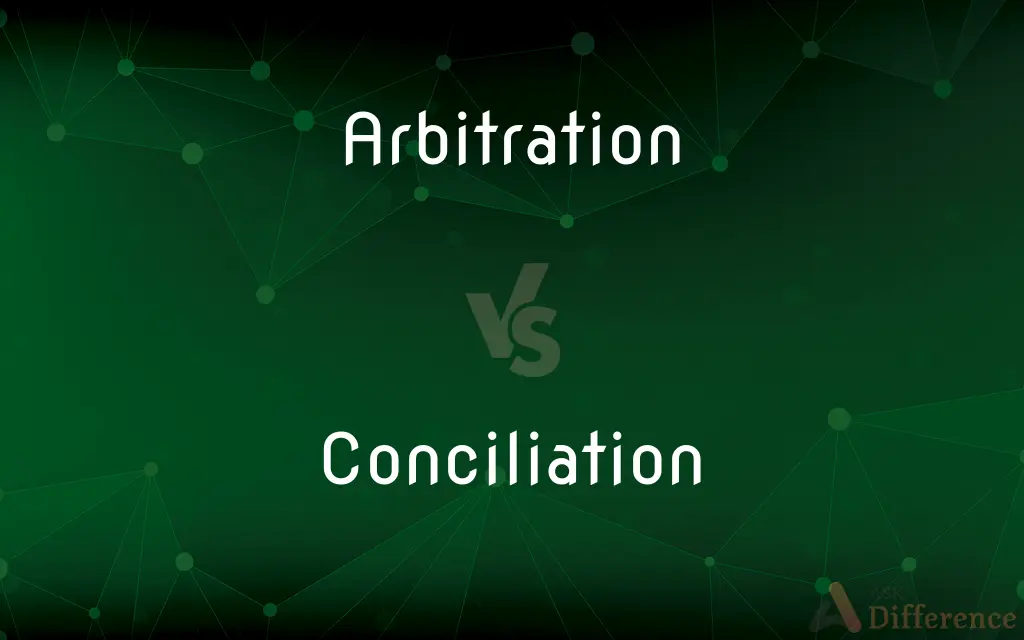Arbitration vs. Conciliation — What's the Difference?
By Fiza Rafique & Urooj Arif — Updated on March 15, 2024
Arbitration involves a neutral third party making a binding decision on a dispute, while conciliation focuses on facilitating a voluntary agreement between the parties.

Difference Between Arbitration and Conciliation
Table of Contents
ADVERTISEMENT
Key Differences
Arbitration is a formal dispute resolution process where the conflicting parties present their cases to an arbitrator, who then makes a decision that is typically binding. On the other hand, conciliation is a more informal method of dispute resolution, involving a conciliator who meets with the parties separately and together to help them reach a mutually acceptable agreement. The conciliator provides advice and suggestions but does not make a binding decision.
In arbitration, the arbitrator plays a direct role in determining the outcome of the dispute, similar to a judge in a court of law. This process is governed by rules that may be predetermined by the parties or by an arbitration institution. Conversely, in conciliation, the conciliator's role is more about facilitating communication and understanding between the parties, encouraging them to find a common ground and reach an agreement on their own.
Arbitration can be more adversarial, mirroring the court system, where each party presents evidence and arguments to support their case. This format is structured and rule-based, with less flexibility in the proceedings. In contrast, conciliation is characterized by its flexibility and collaborative approach, aiming to preserve or even improve the relationship between the parties by fostering a cooperative dialogue.
The outcome of arbitration, the arbitrator's decision, is usually final and enforceable in a similar manner to a court judgment. This gives the parties a clear resolution but also limits their ability to appeal the decision. On the other hand, because conciliation leads to a voluntary agreement, it relies on the willingness of both parties to comply, and the outcome is not enforceable unless the agreement specifies otherwise.
While both arbitration and conciliation are less formal than litigation and can be quicker and more cost-effective, they serve different needs based on the nature of the dispute and the relationship between the parties. Arbitration is preferred when parties seek a definitive resolution, whereas conciliation is chosen to encourage negotiation and preserve relationships.
ADVERTISEMENT
Comparison Chart
Decision-making
Binding decision by an arbitrator
Facilitates voluntary agreement; no binding decision
Role of Third Party
Acts as a judge, makes a ruling
Acts as a mediator, advises and suggests
Formality
More formal, structured process
Informal, flexible approach
Outcome
Final and enforceable, similar to a court judgment
Depends on parties' agreement, not directly enforceable
Preferred when
A definitive resolution is needed
Preserving relationships is important
Compare with Definitions
Arbitration
A dispute resolution process where a neutral third party renders a binding decision.
The contract dispute was resolved through arbitration.
Conciliation
A process aiming to help parties reach a voluntary agreement.
The labor dispute was settled through conciliation.
Arbitration
Can be binding or non-binding, depending on the agreement.
Binding arbitration decisions are enforceable in court.
Conciliation
Focuses on preserving and improving relationships.
The conciliation process improved the business partnership.
Arbitration
The arbitrator's decision is called an award.
The arbitration award was in favor of the employee.
Conciliation
Involves a conciliator who facilitates communication and proposes solutions.
The conciliator suggested several compromises.
Arbitration
Often chosen for its efficiency and the finality of the decision.
Companies frequently include arbitration clauses in their agreements.
Conciliation
More flexible and less formal than arbitration.
Conciliation meetings can be held in a neutral, informal setting.
Arbitration
Involves a hearing similar to a court trial.
Evidence and witness testimonies are presented during the arbitration process.
Conciliation
The agreement reached is not binding unless formalized in a contract.
The parties signed a contract following successful conciliation.
Arbitration
Arbitration, a form of alternative dispute resolution (ADR), is a way to resolve disputes outside the judiciary courts. The dispute will be decided by one or more persons (the 'arbitrators', 'arbiters' or 'arbitral tribunal'), which renders the 'arbitration award'.
Conciliation
Conciliation is an alternative dispute resolution (ADR) process whereby the parties to a dispute use a conciliator, who meets with the parties both separately and together in an attempt to resolve their differences. They do this by lowering tensions, improving communications, interpreting issues, encouraging parties to explore potential solutions and assisting parties in finding a mutually acceptable outcome.
Arbitration
The use of an arbitrator to settle a dispute
Tayside Regional Council called for arbitration to settle the dispute
Binding arbitration
Conciliation
The action of stopping someone being angry; placation
He held his hands up in a gesture of conciliation
Arbitration
The process by which the parties to a dispute submit their differences to the judgment of an impartial person or group appointed by mutual consent or statutory provision.
Conciliation
To overcome the distrust or animosity of; appease.
Arbitration
The act or process of arbitrating.
Conciliation
To regain or try to regain (friendship or goodwill) by pleasant behavior.
Arbitration
A process through which two or more parties use an arbitrator or arbiter in order to resolve a dispute.
Conciliation
To make or attempt to make compatible; reconcile
Tried to conciliate the conflicting theories.
Arbitration
In general, a form of justice where both parties designate a person whose ruling they will accept formally. More specifically in Market Anarchist (market anarchy) theory, arbitration designates the process by which two agencies pre-negotiate a set of common rules in anticipation of cases where a customer from each agency is involved in a dispute.
Conciliation
To gain or try to gain someone's friendship or goodwill.
Arbitration
The hearing and determination of a cause between parties in controversy, by a person or persons chosen by the parties.
Conciliation
The process of bringing peace and harmony; the ending of strife.
Arbitration
(law) the hearing and determination of a dispute by an impartial referee agreed to by both parties (often used to settle disputes between labor and management)
Conciliation
(legal) A form of alternative dispute resolution, similar to but less formal than mediation, in which the parties bring their dispute to a neutral third party, who helps lower tensions, improve communications and explore possible solutions.
Arbitration
The act of deciding as an arbiter; giving authoritative judgment;
They submitted their disagreement to arbitration
Conciliation
The act or process of conciliating; the state of being conciliated.
The house has gone further; it has declared conciliation admissible previous to any submission on the part of America.
Conciliation
The state of manifesting goodwill and cooperation after being reconciled;
There was a brief period of conciliation but the fighting soon resumed
Conciliation
Any of various forms of mediation whereby disputes may be settled short of arbitration
Conciliation
The act of placating and overcoming distrust and animosity
Common Curiosities
What is arbitration?
Arbitration is a dispute resolution process where an arbitrator makes a binding decision on a conflict.
What is conciliation?
Conciliation is a method where a conciliator helps parties reach a voluntary, mutually acceptable agreement.
How does arbitration differ from conciliation?
Arbitration results in a binding decision by an arbitrator, while conciliation aims to facilitate a voluntary agreement without imposing a decision.
Who pays for arbitration and conciliation?
Typically, the costs are shared by the parties involved, though specific arrangements can vary.
When is arbitration preferred?
Arbitration is preferred when parties seek a definitive and enforceable resolution to their dispute.
Can you appeal an arbitration decision?
Generally, arbitration decisions are final with limited grounds for appeal.
Is the decision in arbitration enforceable?
Yes, arbitration awards are usually enforceable in the same way as court judgments.
Can conciliation decisions be enforced?
Conciliation agreements are not directly enforceable unless they are formalized into a contract.
Which is more formal, arbitration or conciliation?
Arbitration is more formal, with structured proceedings similar to court trials, while conciliation is more flexible and informal.
Why choose conciliation?
Conciliation is chosen to preserve relationships and encourage a cooperative approach to resolving disputes.
What happens if parties don't reach an agreement in conciliation?
If an agreement is not reached, parties may choose to resolve their dispute through arbitration, litigation, or another dispute resolution method.
Share Your Discovery

Previous Comparison
EFT vs. ACH
Next Comparison
Cacophony vs. DissonanceAuthor Spotlight
Written by
Fiza RafiqueFiza Rafique is a skilled content writer at AskDifference.com, where she meticulously refines and enhances written pieces. Drawing from her vast editorial expertise, Fiza ensures clarity, accuracy, and precision in every article. Passionate about language, she continually seeks to elevate the quality of content for readers worldwide.
Co-written by
Urooj ArifUrooj is a skilled content writer at Ask Difference, known for her exceptional ability to simplify complex topics into engaging and informative content. With a passion for research and a flair for clear, concise writing, she consistently delivers articles that resonate with our diverse audience.
















































